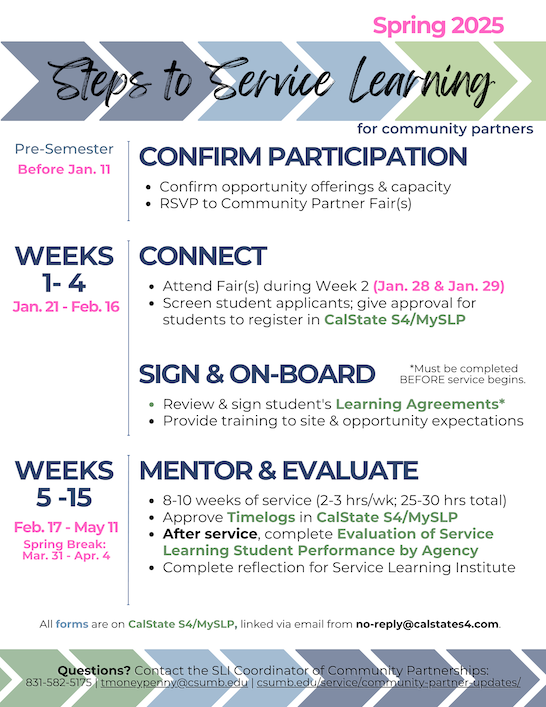Community Partner Information
Check Opportunities
Current semester opportunity listings
Create new opportunities
If you have an opportunity to add to our database - either just for this term or on-going - use this create new opportunity link.
Here’s an example of a well-informed opportunity. Here are some tips for completing the opportunity form.
Orientations for Service Learning Partners
The Coordinator of Community Partnerships hosts orientations for community partners and site supervisors before the beginning of each semester. Topics include: recruitment during Community Partner Opportunity Week (CPOW!), semester timeline and expectations, tips for tracking and supporting students, and a review of CalState S4 forms.
Fall 2025
Please plan to attend one of the sessions below if you are new or newly-returning to CSUMB service learning.
| Orientation details | Orientation #1 | Orientation #2 |
|---|---|---|
| Date | Tue, Aug. 19, 2025 | Fri, Aug. 22, 2025 |
| Time | 11a.m.-12 noon |
9-11 a.m. |
| Location | Zoom link |
In-person CSUMB Service Learning Institute, Building 12 (Student Center) Room 110 University Center 4314 6th Ave, Seaside, CA 93955 Includes light refreshments & an opportunity to meet with faculty in person! |
| Notes |
Includes light brunch & an opportunity to meet with faculty in person! Parking passes provided upon arrival. |
A recording of a virtual session will be available shortly after the sessions.
Fall 2025 - Community Partner Fairs
The courtesy of an RSVP before Wed, Aug. 20 is appreciated, for planning purposes
| Virtual Fair | In-person Fair | |
|---|---|---|
| Date | Tue, Sep. 2, 2025 | Wed, Sep. 3, 2025 |
| Time | 11 a.m. - noon | 11 a.m. - 1 p.m. |
| Location |
Main Quad (inclement weather location: Building 12) |
|
| Additional Info | Open to all partners! |
Partners arrive by 10:45 a.m. Parking passes provided day-of |
Check this RSVP list if you are not sure if your organization already sent in a response. (Note: the list may be one day delayed in updating.)
Service Learning Semester Timeline for Partners
Click here for a printable and accessible version of the timeline for partners.

- Provide a Job Description. A clear service learning job description outlining tasks, responsibilities, and required skills must be prepared and given to the student. Positions that carry some degree of responsibility and involve client contact are ideal.
- Be selective. Be aware that some students may not match your needs. If a student's qualifications and/or motivations are not in harmony with your needs, it is your right and obligation to request a different student.
- Orient, train, and supervise! Students require a carefully structured orientation to your agency, staff, and clients. Introduce them to staff, provide a tour of the facility, discuss emergency policies, accident procedures, and the rules and regulations of the site. Explain your mission and familiarize students with key community and societal issues facing your organization (i.e., "the bigger picture" - why you do what you do and how the student can contribute to this end). Use the "Orientation Checklist for Partners" provided along with information in the next section to help plan the orientation.
- Be realistic with your time commitment and expectations of students. Think in terms of semesters and the academic calendar. Remember that you will have to be aware of the semester schedule and adapt accordingly (offer training sessions during the early part of the semester and expect students for an average of 3-5 hours for a 10-week period).
- Be an involved mentor and teacher for students. The supervisor is truly a partner in the student's education and should view themselves as an educator. Throughout the assignment, help the student interpret the experience and the relationship between what they are doing and the work of the agency and others. At the beginning of the semester, the student will ask you to review and sign their Learning Agreement. This plan will clarify the student's learning objectives and job responsibilities. Your relationship with the student is one of the most significant elements of the service learning experience and often determines the success of the placement.
- Complete placement forms in partner database, CalState S4. Supervisors receive links to review and sign each student's Learning Agreement, Timelog, and Evaluation of Student Performance by Agency.
- Say "Thank you" to students. Like everyone, students want to be welcomed and appreciated. This may take many forms, from letters of recognition to a thank you note or a verbal acknowledgment of a job well done. They also need to see how their work is important to your agency's mission. Ask students how they're doing and what could be improved.
- Talk to us. Complete and Return Two Evaluations. Keep the Service Learning Institute staff informed of any concerns, suggestions, or other pertinent issues related to the placement and/or the student. We are here to facilitate the process and assist you in any way possible. In addition to the Evaluation of Student Performance by Agency that goes to the student and course professor, please also complete the Evaluation of the Service Learning Process by Community Partner from the Service Learning Institute staff.
Students require a carefully structured orientation to your agency, staff, and clients. Introduce them to staff, provide a tour of the facility, and discuss emergency policies, accident procedures, and the rules and regulations of the site. Explain your mission and familiarize students with key community and societal issues facing your organization (i.e., "the bigger picture"--why you do what you do and how the student can contribute to this end). Use the "Orientation Checklist for CSUMB SL Partners" provided to help you plan your orientation.
For your reference, here are the documents provided to students: Student’s Rights and Responsibilities and Participation Guidelines.